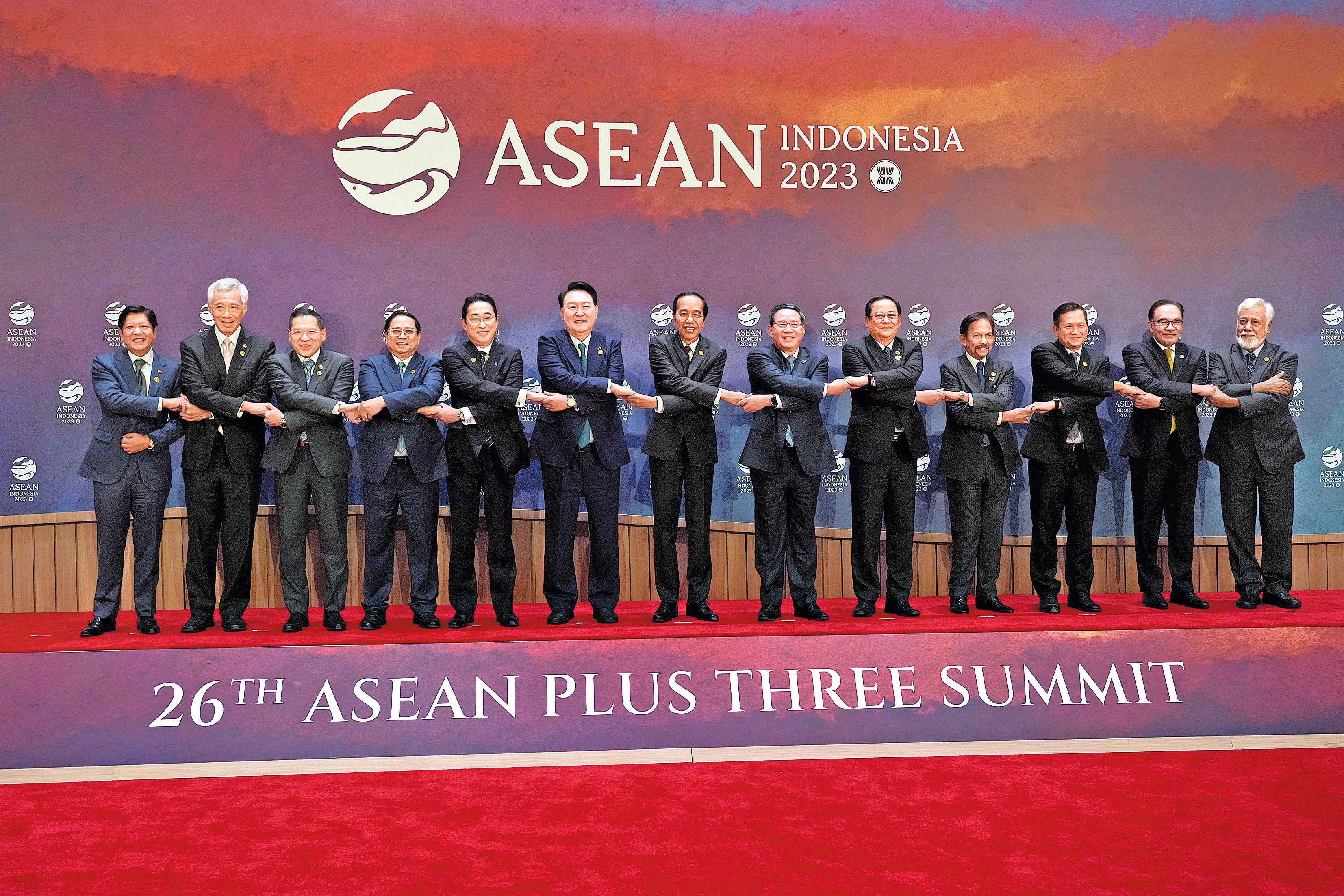Premier says ASEAN+3 is vital tool in promoting regional prosperity, addressing challenges
 Premier Li Qiang (sixth from right) joins hands with other leaders at the 26th ASEAN-China, Japan, and ROK leaders’ meeting in Jakarta, Indonesia, on Sept 6, 2023. (PHOTO / REUTERS)
Premier Li Qiang (sixth from right) joins hands with other leaders at the 26th ASEAN-China, Japan, and ROK leaders’ meeting in Jakarta, Indonesia, on Sept 6, 2023. (PHOTO / REUTERS)
Premier Li Qiang on Sept 6 called for Asian countries, including members of the Association of Southeast Asian Nations (ASEAN), China, Japan, and the Republic of Korea, to focus on the overall interests of Asia’s peaceful development and jointly address various risks and challenges in a bid to promote regional prosperity and stability.
Li made the remarks when addressing the 26th ASEAN-China, Japan, and ROK (10+3) leaders’ meeting in Jakarta, Indonesia.
The premier said that the ASEAN Plus Three cooperation mechanism has undergone numerous crises and tests in the past 20 years, but it has played an important role in promoting regional development and prosperity. “The more difficult it is, the more we need to seek solidarity and cooperation.”
As the world is entering a new period of turbulence and changes and global development endeavors face tremendous challenges, Li emphasized the need to prioritize development in regional cooperation, eliminate all kinds of interference, tap into cooperation potential, and strive to explore a more stable, vibrant and inclusive development path.
China is willing to work with all parties to take the implementation of the new ASEAN Plus Three Cooperation Work Plan as an opportunity to promote regional economic integration and connectivity, enhance partnership in innovation and the digital economy, and strengthen sustainable development and poverty reduction efforts, Li said.
He called for further releasing the dividends of the Regional Comprehensive Economic Partnership (RCEP) and promoting the free flow of factors of production to expand and upgrade trade and investment.
“We hope that all parties will support Hong Kong’s accession to the RCEP as one of the first new members,” he added.
The premier also emphasized the need to leverage the strengths of geographical proximity and economic complementarity to optimize and upgrade industrial and supply chains in the region.
“China is willing to deepen cooperation with all parties in areas such as the digital economy, clean energy, and new energy vehicles to promote the development of emerging industries and cultivate more new economic growth points together.”
During the meeting, Li reiterated China’s position on the issue of Japan’s discharging of nuclear-contaminated water from the Fukushima nuclear plant, urging Japan to faithfully fulfill its international obligations and engage in full consultations with neighboring countries and other stakeholders to handle the issue responsibly.
While attending the 26th China-ASEAN leaders’ meeting earlier on Sept 6, Li commended the development of ties between China and ASEAN, saying that over the past decade, China and ASEAN have maintained a relationship characterized by sincerity, mutual assistance, mutual benefit, mutual coordination, and inclusiveness.
They have worked together to forge a path of long-term good neighborliness, friendship, and shared development and prosperity amid the evolving global landscape, he added.
Li underlined the need for China and ASEAN to promote cooperation in emerging industries, such as new energy vehicles, photovoltaics, and artificial intelligence, expand people-to-people exchanges, and enhance cooperation in fields such as culture, tourism, training, and youth.
Noting that China and ASEAN are inseparable neighbors, brothers, and partners, the premier emphasized the importance of maintaining regional peace and stability by actively advancing consultations on the Code of Conduct in the South China Sea and cooperating in combating telecommunication and cyber fraud.
The leaders of ASEAN countries attending the meeting highly praised the achievements of ASEAN-China cooperation, saying that the comprehensive strategic partnership between ASEAN and China has brought great benefits to the people of the region and promoted regional peace, development, and stability.
ASEAN countries welcome the progress made in formulating the Code of Conduct in the South China Sea and look forward to the early conclusion of the negotiations on upgrading the ASEAN-China Free Trade Agreement, they added.


